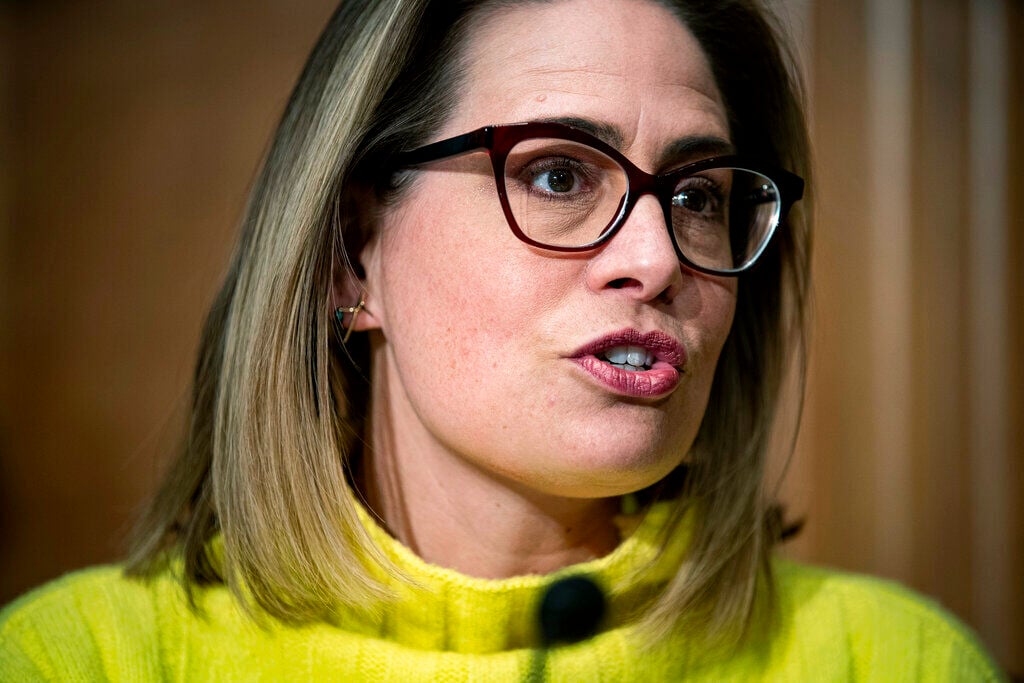You can’t really call Kyrsten Sinema a centrist. “Moderate” isn’t quite the right descriptor either.
Yeah, she’s a Democratic senator who sometimes stands in the way of Democratic initiatives, and who occasionally supports Republican ones. And sure, every other word she utters is “bipartisan.”
But she just flashed again a tendency toward a sort of immoderate extremism.
This week, Sinema stopped holding out and committed to vote for the Inflation Reduction Act, a deceptively named bill that mostly works to reduce carbon emissions and lower drug prices. It might also reduce inflation a little bit in the process, economic analyses show.
What was strange was the top condition Sinema demanded to guarantee her support. She demanded that Democrats delete a change to tax law in the bill that would have made some wealthy financial-sector employees pay more taxes.
Here I’m referring to the so-called carried-interest loophole, which allows the partners in private-equity firms such as hedge funds to pay a tax rate on their investment income of 20% instead of 37%. Investment income is the main source of pay for these high-level investors, yet it is not taxed like the pay that you and I make.
In order to qualify for that lower rate, they have to keep the asset, the one that’s making them the money, for at least three years. This part of the Inflation Reduction Act would simply have lengthened that time limit for holding the investment to five years. Holding the asset any less would subject them to higher tax rates.
So, the bill didn’t even eliminate the loophole, as it should. Republicans and Democrats, both Donald Trump and Joe Biden in fact, have called for the carried interest loophole to be eliminated.
It is basically a tax-break for some of the wealthier people in the country — the people who don’t need it the most. But it has proven incredibly resistant.
Not surprisingly, the private-equity executives are fighting the change, and they have the money to make their opinions count. In fact, Sinema has been a big recipient of campaign donations from the private equity and investment sector.
Her campaign has taken in $2.2 million from employees or PACs in the securities and investment industry, according to the Center for Responsive Politics. It’s her second highest category of donations, below retired people and above lawyers.
In 2020, her first year as a senator, she briefly interned at a California winery, called Three Sticks, owned by a private-equity investor named Bill Price. Later she held a fundraiser there.
But not every senator who gets donations from the investment industry bows to them on this issue. Sen. Chuck Schumer, who’s from the center of the financial universe in New York City, gets the most donations from that industry of any senator. He still supports eliminating the loophole.
None of this, as you may have noticed, has anything much to do with Arizona. Sinema tried to make a case that there is an Arizona connection in her office’s explanation of her propping up this tax break for the wealthy.
“Kyrsten has been clear and consistent for over a year that she will only support tax reforms and revenue options that support Arizona’s economic growth and competitiveness,” her office said in a written statement. “At a time of record inflation, rising interest rates, and slowing economic growth, disincentivizing investments in Arizona businesses would hurt Arizona’s economy and ability to create jobs.”
But I have seen no evidence that taxing wealthy investors’ income at a higher rate would significantly affect Arizona’s economy.
Defending Sinema’s position, the American Investment Council put out a series of statements and explainers showing that private equity investment has had a positive effect on Arizona. I’m sure that’s true. It still doesn’t explain why the partners in their companies should have their income taxed at a lower rate than everyone else.
Interestingly, though, Sinema signed onto other tax increases that would raise much more money than altering the carried-interest loophole would have. These taxes help make the bill a net deficit-reducer by about $300 billion.
She agreed to a plan to impose a 1% tax on all stock buybacks by companies, a recently popular practice by which businesses spend their own money to raise their own stock price.
She also agreed to the 15% minimum tax on corporations that net more than $1 billion in annual income. Here Sinema did demand some changes that would benefit manufacturers by retaining a depreciation mechanism that I won’t pretend to understand.
She also ensured that billions of additional funding for water and other drought relief in the West is included. Anything to improve water supplies and drought response is clearly a good thing for Arizona. Based on this, we know that she knows what it means to use her leverage for Arizona’s benefit.
That only makes it more frustrating, though, that she would stick her neck out for private-equity investors. It’s a brazen display of immoderation.
For Star subscribers: After what looks to be a surprise GOP primary win, Democrats think they have a chance to win the state Senate seat in Legislative District 17.
For Star subscribers: Pinal County Sheriff Mark Lamb, a raw partisan, wants to insert sheriffs into election investigations.
For Star subscribers: At polling places across Tucson, voters expressed fear and anger about those on the other side of the political divide.








